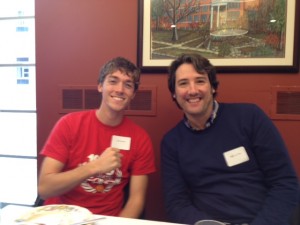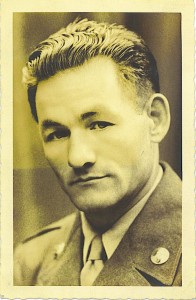Teaching Institute Leads to POW’s Letter
Among the high school teachers who attended ALBA’s teaching institute at Illinois Wesleyan University in Bloomington last November was Dean Burrier Sanchis, a Spanish teacher at Elk Grove High School near Chicago, and the grandson of Lincoln veteran Vincent Sanchis Amades. Dean brought along a letter his grandfather wrote soon after he was released from the prisoner-of-war camp at San Pedro de Cardeña in 1939. He was having trouble deciphering the handwriting and Peter Carroll helped him with the task. We print here Dean’s letter to ALBA, followed by his grandfather’s letter, titled “This is Fascism.”
Mr. Carroll,
Thank you so much again for your words, spirit and time this weekend. I cannot tell you how much it meant to me personally to be able to be in the same room as you and Sebastiaan and feel the work that is being done will really make an impact. I cannot wait to personally make some meaningful contributions as well.
I am sending you the letter that we looked at this weekend. If there is any possibility or aid you can offer with the transcription, I would greatly appreciate it. Even just in those few minutes you were able to break through some of the things I could not in the years that I have had that document. I am attaching both the original as well as my best attempt at a transcription.
Un saludo camarada,
Dean
4/12/1939
Pase de la Hévé
Le Havre, France
This is Fascism
San Pedro de Cardeña was my first cup of forced brutality. A 300 year old former palace of the Cid with its crumbling dismal walls was the concentration camp I was taken to on April 7th, exactly 8 days after my capture in the Aragon Front.
I was jammed into the basement together with 200 other Intern[ationals]. I realized then how a canned sardine feels, there was barely room enough to turn around. The floors were filthy and lice were conspicuous at all times. One toilet on the outside was available to us only 3x a day.
I can’t very well [describe] the food; no words of mine can adequately describe that. Sufficient to say we all envied the way the pigs were fed in our respective countries.
Every morn[ing] we were taken out to the square for the flag salute. We were forced to stick our hands out in the fascist style. The first few days there, we refused to obey this order, but soon we learned that discretion is the better part of valor.
We had to attend Mass every Sunday morning regardless of our religious denomination. Guards were placed around us, armed with fixed bayonets, and woe betide those required to go down on their knees and pray. I remember two German lads who remained standing when the rest of us were down. They were taken away immediately after the sermon and so badly beaten that they were unable to eat for several days.
All the sergeants carry sticks with them. These sticks are made of twisted wood and loaded at one end and how they enjoyed the exercise afforded them when beating us up. The backs of many of own Comrades still carry the trade mark of those weapons.
The German comrades lived in constant fear of the Gestapo.
They were taken into a room daily and put th[rough] a form of 3rd degree and the way they suffered one can hardly conceive of such brutality.
Today, I am a free man and I think I can say without fear of contradiction unless one has suffered in a fascist concentration camp, as we [were] suppressed, they can never hope to appreciate fully the true meaning of the word –
Liberty!!!
Vincent Sanchis Amades














